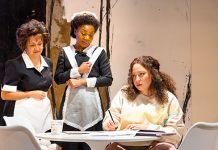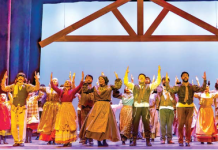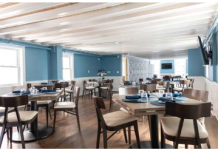By Judy O’Gorman Alvarez
Dorothea Wotton wasn’t even 2 years old when her father Rodney died in the World Trade Center on Sept. 11, 2001. She doesn’t remember the event, just the questions, the loss and the sadness that has followed in the 15 years since then.
Dorothea, a junior at Trinity Hall who turns 17 in October, never liked talking about the events of that day. As much as people tried to understand and be sympathetic, “When you talk about (the loss), people can’t relate,” she said. “You’re just doing your pity story.”
Encouraged by her mother, Dorothea spent a week last summer at a novel camp, held at Bryn Mawr College, Pennsylvania, that offered young people from around the world who have lost a family member through terrorism or war, a chance to unite and share their thoughts, feelings and hopes for the future.
Since 2008, Project COMMON BOND has brought young adults, ages 15 to 20, who share a tragic “common bond” together from more than 20 nations. Participants work on communication, global leadership activities, peace building and negotiation through therapeutic arts, music, drama, movement and sports.
Project COMMON BOND is a part of Tuesday’s Children – formed in the aftermath of September 11, 2001 – a response and recovery organization that supports youth, families and communities impacted by terrorism and traumatic loss.
Dorothea was concerned the camp would be filled with grief and tears and a rehashing of the events that led to losing loved ones. Instead she found friendship and comfort.
The camp gave her an opportunity to bond with people who have had similar heartbreaking experiences.
A girl from Norway told about her sister who was killed in the shooting attack at a summer camp in 2011, and a boy spoke of losing his mother in the 2004 Madrid train bombings.
At first Dorothea was resistant to talking about her loss, but the camp “wasn’t all about being sad, rather how can we grow from this? It was more about peace rather than grief,” she said.
“I don’t have to be alone,” Dorothea said of her feelings. “Before (the camp), I felt nobody can really relate.”
Among the usual camp exercises, activities included a version of musical chairs where a team had to find a way to squeeze onto one chair. Or a human knot, where they joined in a convoluted mesh of hands and arms and worked to untangle themselves without breaking the bond.
“It was hard, but it was fun,” she said. “And it was a lot of bonding.” The camp allowed her to develop friendships with teens from as nearby as New York and as far away as Sri Lanka.
“Project COMMON BOND emphasizes the commonalities shared by participants, despite their varied religious, economic, ethnic, racial, and political backgrounds,” said Deirdre Dolan, program manager for Project COMMON BOND. “It is so rewarding to be able to provide an opportunity for teens and young adults directly impacted by terrorism to find not only a voice, but a global community of support that promotes healing and empowers them to transform their experiences of loss into positive action.”
As the 9/11 anniversary draws near, Dorothea takes comfort knowing she maintains a connection with her newfound friends.
“Every year I get reminded,” she said of the anniversary. “I’m already thinking about it days before and days after. It’s on the TV, it’s everywhere. You can’t be sheltered. It’s not like when a parent just died of a natural cause. It’s always in your face. You’re always reminded.”
But the connections she felt – and continues to feel – for her new friends has helped her as this Sept. 11 approaches. “It’s a strong connection that we have. It’s really a community. We were all there for each other.”
Dorothea feels the camp has also helped her and the other campers deal with new crises that might arise. “We knew we would all be able to work it out. Nobody wants another to suffer. We were really there for the same thing—for peace.”














